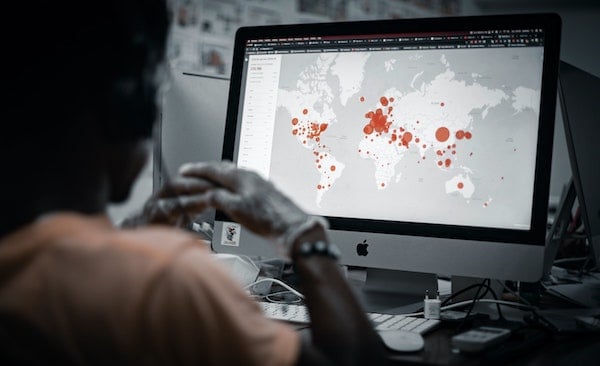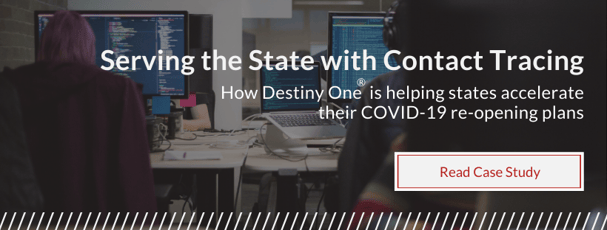Published on
Public Health in a Remote Environment: How the University of Hawaii is Delivering Contact Tracing

To help accelerate the re-opening of state economies, it’s essential to reduce the spread of coronavirus and the COVID-19 illness it causes. The first step to actually accomplishing this work is employing trained contact tracers who work actively in every community, helping to identify and quarantine individuals who have been in contact with those who contracted the illness.
Training such a workforce is no small matter, and universities are playing a central role in these efforts. Continuing education units in particular are providing support, as they have experience in offering customized training engagements in partnership with traditional faculties. But contact tracing requires a level of speed and scale that most training engagements never reach.
In this interview, William Chismar and Sarah Simmons explain how the Outreach College at the University of Hawaii is leveraging its divisional expertise and technological infrastructure to deliver contact tracing training across the state, and reflect on how this work is raising Outreach College’s profile across campus and beyond.
The EvoLLLution (Evo): What is contact tracing training?
Sarah Simmons (SS): This training exists to build a surge capacity workforce to respond to COVID-19 in Hawaii specifically. If we’re seeing a surge in our number of cases, we need to be able to match surge numbers with our own contact tracing capacity, far beyond what the Department of Health is able to accomplish on its own.
In essence, we’re looking at having a civilian force of contract tracers that can be hired rapidly to expand contact tracing capabilities and help track and contain the spread of COVID-19.
Evo: Do the people who complete the training get a type of certification that shows that they’re knowledgeable and compliant with contact tracing standards?
SS: Yes. The School of Nursing and Dental Hygiene, who designed the contact tracing program, requires students to pass an exam as part of the curriculum. We’re grading that exam through Destiny One and issuing certificates of completion to show that students made it through the course—after the School of Nursing signs off. They’ll then present the Department of Health with that certificate to show proof of completion.
The EvoLLLution (Evo): How does offering contact tracing programming align with the public service mission of the university?
SS: Hawaii is a special state. We’re a very close community with a very diverse ethnic population compared to the bulk of the United States. And we’re also spread across islands and geographically isolated from the mainland, here in the Pacific Ocean.
It’s key for us to be able to train locals who can assist on our neighboring islands and in underserved populations that might not be easily reachable by regular methods. These communities need someone who they know and trust to question them in the right manner and in the right language to facilitate this process and get the answers we need for fast community response.
William Chismar (WC): It is a public institution’s mission in particular to serve the state, so our first responsibility is to the citizens of Hawaii. When the Department of Health was addressing the pandemic—the issue of contact tracing and the need for training—the university immediately comes to mind.
They had contacted the university through the president’s office, which then went through the vice president of research to determine who was fit for the job. In our case it was split, but it really came down to the School of Nursing. We had partnered with them quite a bit on other programs. They really take their requirement of serving the public seriously. So, they contacted us and said, “We want to do this, and would you be willing to help out?”
For context, a few weeks earlier, the nursing school came to us with the idea of launching free online training for contact tracing. They were willing to create the content but needed help creating the courses, marketing them to potential students and processing enrollments. Using Destiny One, we got the program up and running in a day and began generating enrollments—not just from people in Hawaii but people all over the country. Within a week, several thousand people had taken it.
It’s a great opportunity for Outreach College to really take a role in providing a critical public service.
Evo: What are some of the major operational differences between running contact tracing training and running other, more traditional, Outreach College programs?
WC: We don’t have a lot of fully asynchronous online programs, which means we generally have a great deal of interaction with our students. We do a lot of student support and facilitate logistics issues.
For contact tracing, these are entirely asynchronous and online offerings. It’s something Outreach College wanted to do more of, but it also required a fundamental change in how our staff uses our tools and systems. So, this was a great opportunity to undergo that change.
The other thing that’s interesting about contact tracing that an extremely high number of people wanted to do take this training because of the high unemployment rate here. By April 2020, Hawaii’s unemployment rate reached 22.3%. As such, anything that leads to a job is of interest.
However, our Department of Health did not want that many people taking the course and getting certified if there wasn’t a job available for them. So, another unique aspect of managing this offering is that the Department of Health pre-screened applicants and wouldn’t let people they weren’t willing to hire take the training.
Unlike the free offering we previously ran with the School of Nursing, contact tracing training is not open to everyone. This is training specifically for people in Hawaii who have been pre-screened by the Department of Health. That level of applicant management also creates some operational differences for us.
SS: In a regular corporate training engagement, the client comes to us looking for a specific solution to a specific challenge. In this case, we’re not just working with a department looking to offer a course on a topic. We’re working with numerous stakeholders across the state government and the Department of Health. Applicant management also created some unique challenges. The School of Nursing had a waitlist of prospective students interested in this track before we even launched the course. The large numbers of interested students present some interesting challenges. We have to ensure applicants are qualified, and we’re having to separate applicants who are healthcare professionals from people trying to take courses open to the general public.
With this scale, we also have to be conscious of the overall management of their enrollments and the grading and certificate issuance. There’s just a larger scale and a much more rapid pace to it all, which we don’t experience with a usual course.
Evo: Why are divisions like Outreach College so well-positioned to support the management of contact tracing training in this case, but also innovative and creative programming in general?
WC: Our ability to successfully support and run offerings like this comes down to the flexibility we have as a college not bound to a particular academic discipline. We work with other colleges on all of our credit-bearing programs and build strong relationships. We add value to partnerships by doing things that other schools don’t have to do. That value can be found in our student registration management or program promotion by building high-quality websites and facilitating payments. We take these tasks off our partners’ plates, so they can focus on creating and delivering high-quality course material.
The huge benefit of using the Destiny One system is that we can launch new offerings quickly and manage them effectively. We were able to get the COVID-19 training launched in a single day. Without Destiny One, we would have had to build a website with all the necessary security aspects in place, and figure out a database for collecting information, all manually. With Destiny One, we’ve positioned ourselves as a service unit that can deliver aspects of course and program management that other divisions don’t have the capacity to do.
Of course, we don’t want people to view us purely as a support service unit, and our value extends beyond our infrastructure. We provide expertise, and we work with our partners to help them understand how best to do this work. Whether it’s the marketing and promotion of programs, or the management of customer experiences and student questions, we know how to navigate this work.
As a result of our expertise, we maintain very good relationships with the colleges on our campus, and the School of Nursing is a good example of that.
SS: Outreach College specializes in delivering course content and administration of courses and programs aimed at special populations of students. We serve adult learners looking to upskill in workplace environments for advancement and personal enrichment. We already have a non-credit background and are able to rapidly launch and support innovative courses for unique student groups. We offer flexible programs–both for credit and non-credit–and assist any student in reaching their goals.
In this case, we’re able to harness these strengths to support the state.
Evo: Has the pandemic changed the way your unit has been valued?
WC: The pandemic has really helped us in a number of surprising ways. When we got the open-access COVID-19 training up within a day for the School of Nursing, it helped change the image that some people have of continuing education. Some see us as a moneymaking unit; I’ve heard people say, “All you guys are interested in is money.” When in truth, all we’re interested in is serving people however we can.
The fact that we did something that ended up being of fairly large scale—having thousands of people go through a program for free—had an impact. When the Department of Health contacted the university, the vice president of research immediately thought of Outreach College because of the COVID-19 training we had just done.
Our colleagues now recognize that we’re a college interested in serving the public and that we have the expertise to do it effectively.
SS: Our colleagues on the main campus see us as a partner who can take their ideas and turn them into reality. We’re able to help them in any capacity with our innovative ideas, whether it’s the marketing of offerings or the administration of courses themselves. We’re here for whatever they need, and we can scale up or down as needed. And partners like Destiny Solutions are giving us the flexibility that we need to launch these innovative offerings and bring them to market faster than we ever could on our own.
Evo: How helpful has the Destiny One tool been in helping to establish Outreach College as an innovative hub for creative programming and for effectiveness in delivering this very immediate and agile need programming?
WC: Destiny One has been extremely helpful in establishing Outreach College’s role. One of the things that we do when we go and talk to another college about a potential program is build a site in Destiny One. This way, when we have our initial meeting about what the program could look like, we can pull up the test site we’ve built to help them visualize the possibilities. This seamlessness has a huge impact on how our colleagues view Outreach College’s professionalism.
When we launched the open-access COVID-19 training with the School of Nursing, they wanted to create the course content but nothing else. They were relying on us to do the rest. And with Destiny One, we could unprecedentedly do that.
SS: Destiny One has been key for us to meet our university’s needs. They’re able to come to us with concepts for a course or program, and we’re able to tell them that we can launch it and start taking enrollments that same day. We’re able to meet the need for urgency and speed that this pandemic has created.
With contact tracing, we offer four free modules to any student who wants to enroll, no matter where they are on earth. Over 3,000 students have enrolled in this broad-based COVID-19 training, and they can earn nursing credits for it in continuing education, which we’ve also been managing through Destiny One. All of this happened because the School of Nursing came to us with an idea that we were able to operationalize through Destiny One as soon as they had the content ready.
Evo: Is there anything you’d like to add about the work that you guys are doing with contact tracing, and what it’s taken to launch the offering and maintain it over the past few weeks?
WC: Because of the infrastructure we have at Outreach College, positioned around Destiny One, we were able to deliver a critical program to the state at a time when we couldn’t wait two weeks to get the offering live.
In this climate, having to wait two weeks has a massive negative impact on our management of COVID-19. Of course, in higher education, waiting two weeks is usually nothing. When developing a program, we’re usually talking about a year to get something up and running.
We could not have done contact tracing training at all without the Destiny One system in place.
This interview has been edited for length and clarity.
Disclaimer: Embedded links in articles don’t represent author endorsement, but aim to provide readers with additional context and service.
Author Perspective: Administrator




